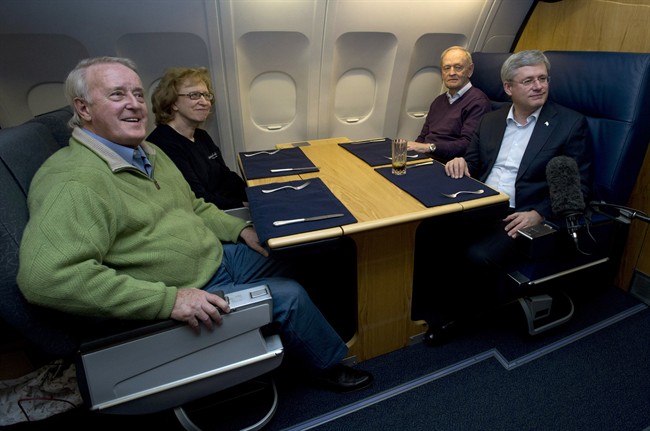From daily security briefings to a salary of over $200,000 per year to lifetime speaking privileges on the floor of the Senate, an American president’s term of office never truly ends.

Things are different in Canada, where a prime minister enters a life of relative obscurity after tendering their resignation to the Governor General. This inconspicuous, graceful exit from public office isn’t even shared among other Commonwealth nations, as former British and Australian prime ministers receive a handsome package of paid expenses to aid them in their post-political life.
Though Canadian prime ministers get to keep the “Right Honourable”, the Canadian Heritage department’s protocol guide says that in conversation, one should address a former prime minister as “Mr./Mrs./Ms./Miss (name)”, a far cry from the lifetime moniker of “Mr./Madam President” held by American heads of state.
WATCH BELOW: Woman of Vision: Kim Campbell

In a thoughtful op-ed in the Ottawa Citizen this week, public historian and former prime ministerial speechwriter Arthur Milnes wrote that Canada’s former prime ministers should be treated as public officials, and given the respect – and money – that goes along with such recognition.
Milnes’ essay is part of a series penned for Canada’s sesquicentennial, but part of the piece’s motivation lies in the sheer volume of ex-prime ministers of Canada right now.
“What makes all this so important to discuss today is the very real fact that our country is blessed with more former prime ministers who are alive and still willing to serve — seven of them — than at any time in our nation’s history since 1867,” he wrote.

Get breaking National news
From John Turner, who entered and left office in 1984, to Justin Trudeau, almost a third of the 23 prime ministers the country has ever seen are still kicking.
- Michael Kovrig reflects on ‘brutally hard’ Chinese detention: ‘You’re totally alone’
- TD Bank moves to seize home of Russian-Canadian jailed for smuggling tech to Kremlin
- U.S. moves to ban Chinese software, hardware from all vehicles in America
- Conservatives set to table non-confidence motion Tuesday. What to expect
READ MORE: Plane Talk with Paul Martin: On Aboriginal rights, his math skills and the U.S. election
Former prime ministers receive pensions, but no other privileges or perks. The Canadian Taxpayers Federation estimates Stephen Harper receives an annual Member of Parliament’s pension of $127,000, which will increase by $58,000 per year when he turns 67.
In Canada, the loss of public benefits seems to match the loss of reputation awaiting our former heads of government. When Joe Clark was assaulted in Montreal in 2007, it was only after the assailant asked him, “Are you Joe Clark, the former prime minister?”
Only in Canada does one need to double check the identity of a prime minister before clocking him in the face.
Though I disagree with Milnes on whether former prime ministers should hold an official role, we are in lockstep in the belief that many of them still have something to offer Canada.
However, I don’t think these offerings are ignored at present. Kim Campbell was tapped by the current government to chair the advisory board for appointing Supreme Court justices. Brian Mulroney has been brought in to help Trudeau’s government liaise with Donald Trump’s administration, in particular on trade issues.
READ MORE: Brian Mulroney serenades Donald Trump with ‘When Irish Eyes are Smiling’ at Mar-a-Lago
Stephen Harper united all living former prime ministers to attend the funeral of Nelson Mandela.
These responsibilities are sometimes informal, but also unpaid. As Milnes points out, not every former prime minister is wealthy. Campbell, due to her short time in office, receives no pension as prime minister or even as a former member of parliament.
Any support staff, office expenses or travel budgets must be paid for privately.
When Harry Truman left the White House, he didn’t even have enough money to hire a correspondence secretary. This sparked the implementation of the Former Presidents Act, which mandated an ongoing salary, office budget and lifetime Secret Service protection for ex-presidents.
But the world has changed since the Truman era. Today’s media climate makes being a former head of government a lucrative job. American presidents make tens of millions of dollars annually from book royalties and speaking fees.
“I’ve never had any money until I got out of the White House,” Bill Clinton told CNN’s Wolf Blitzer in 2010. “But I’ve done reasonably well since then.”
READ MORE: Former PM Joe Clark honoured for international leadership, innovation
Even in Canada, past prime ministers on the speaking circuit attract anywhere from $20,000 to $50,000 per speech, by many accounts, not to mention well-paying postings with think-tanks and law firms.
This allows them to remain accessible to advise the current government, but also to turn their attention towards whatever pet projects they’d like, generally outside of the limelight.
It seems to be working. Campbell has had more of an impact as an advocate and media commentator on non-proliferation, education and global democratization after public life than she ever did within it.
Similarly, Paul Martin has taken up Aboriginal issues with gusto through his foundation.
In the last two years, Stephen Harper has spoken out about Israel, suggesting this may shape at least a part of his post-political legacy.
WATCH BELOW: Ex-PM Stephen Harper says Iranian regime biggest threat to Israel

All of this is done without the celebrity and fanfare that so often impede the work of active duty politicians.
When the sun sets on the political career of prime ministers, it often marks the beginning of another. This quiet power is uniquely Canadian, and we’re better for it.
Andrew Lawton is host of The Andrew Lawton Show on AM980 London and a commentator for Global News.












Comments